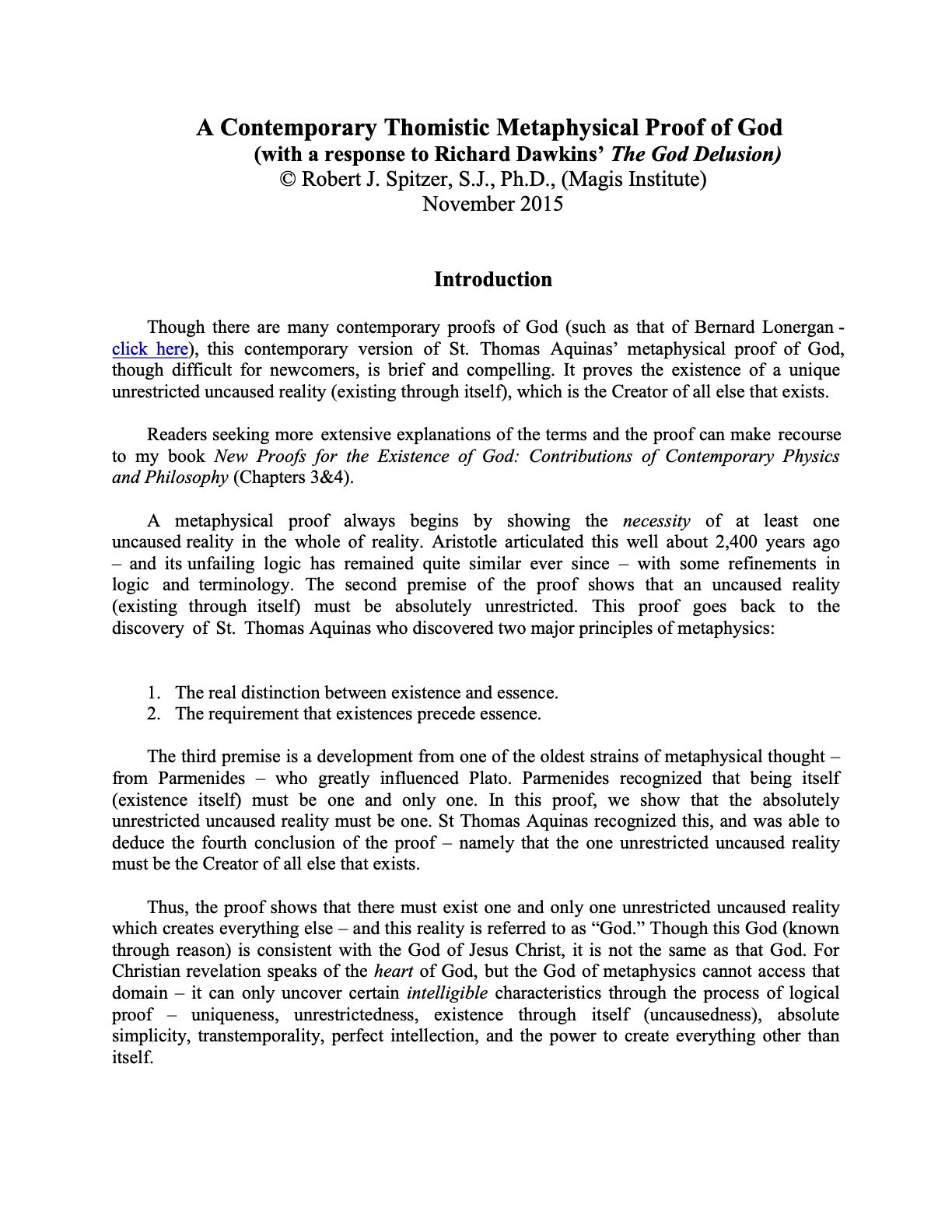The Thomistic proof for the existence of God, rooted in the philosophical insights of St. Thomas Aquinas, stands as one of the most compelling arguments for God's existence. This proof transcends simplistic "first cause" reasoning, offering a robust metaphysical framework that explains the necessity of an uncaused and unrestricted reality as the foundation of all existence. In this blog, we'll break down the Thomistic argument, highlight its philosophical implications, and address common critiques atheists pose.
What Is the Thomistic Proof for the Existence of God?
At its core, the Thomistic Proof for the Existence of God is a sophisticated metaphysical argument that seeks to explain why anything exists at all. Unlike arguments that simply posit God as the "first cause," the Thomistic proof delves deeper into the nature of existence itself. It posits that:
- There must be a real distinction between essence (what something is) and existence (that something is).
- For anything to exist, it must ultimately derive from an uncaused, unrestricted reality and exist through itself.
This "uncaused reality" is what Aquinas identifies as God. Unlike the contingent, restricted beings that make up the universe, this uncaused reality is straightforward and entirely self-sufficient, forming the bedrock of all that exists.
The Role of an Uncaused Reality
Central to the Thomistic Proof for the Existence of God is the idea of an uncaused reality. This is not just another entity within the universe but something entirely unique:
- Unrestricted Existence: This reality does not depend on any external cause and is not limited by any particular mode of being.
- Foundation of Reality: Without such an uncaused reality, the totality of existence would require an external explanation—an impossibility since there is no "outside" to all of reality.
This reasoning concludes that an uncaused, unrestricted reality must exist to explain the universe.
Simplicity and Transtemporality of God
One profound implication of the Thomistic Proof for the Existence of God is the concept of divine simplicity.
- Absolute Simplicity: God, as the uncaused reality, is entirely straightforward—not in a physical sense, but metaphysically. Unlike composite beings, which are made up of parts or properties, God is undivided and unrestricted.
- Eternal and Beyond Time: God exists outside the confines of time. While temporal beings experience existence as a series of moments, God’s existence is independent of time, aligning with classical theological understandings of eternity.
Addressing Atheistic Critiques
The Thomistic Proof for the Existence of God also provides robust answers to common atheistic objections.
- Bertrand Russell’s Critique: Russell famously questioned the idea of a "first cause," asking why God doesn’t require a cause. Aquinas’ proof sidesteps this by demonstrating the necessity of an uncaused reality, which does not require an external explanation.
- Richard Dawkins’ Complexity Argument: Dawkins argues that a designer must be more complex than its designs, making God improbable. However, the Thomistic proof views God not as a complex being but as the simplest, unrestricted reality. This metaphysical simplicity actually makes God more probable, not less.
Theological Implications of the Thomistic Proof
The Thomistic Proof for the Existence of God has far-reaching implications for theology:
- Divine Attributes: Attributes such as omniscience, omnipotence, and omnipresence flow naturally from the concept of an unrestricted, uncaused reality. These qualities arise because God’s essence is to exist without limitation.
- Creator-Creation Relationship: The proof underscores God’s intimate involvement with creation while maintaining a clear distinction. God, as the uncaused cause, sustains all existence without being bound by it.
Rethinking Intelligence and Design
The Thomistic proof also invites us to reconsider modern ideas about intelligence. In materialist perspectives, intelligence is often seen as an emergent property of complex systems. However, the Thomistic perspective challenges this view:
- God as Perfect Intelligence: God embodies the ultimate form of intelligence as an unrestricted act of understanding. This challenges the notion that intelligence must arise from complexity and offers a model that transcends physical limitations.
- Implications for AI: This view has implications for debates around artificial intelligence and consciousness, suggesting that true intelligence may require an unrestricted source rather than mere complexity.
Why the Thomistic Proof for the Existence of God Matters
The Thomistic Proof for the Existence of God is not just a relic of medieval philosophy—it remains highly relevant in contemporary discussions of metaphysics, theology, and even science. By offering a robust explanation for the existence of an uncaused, unrestricted reality, this proof invites us to explore more profound questions about the nature of existence, the universe, and our place within it.
For believers, it provides a profound philosophical foundation for faith. For skeptics, it presents a powerful challenge to materialist worldviews. Either way, the Thomistic Proof for the Existence of God inspires and provokes thought, bridging the realms of philosophy, science, and theology.
The Thomistic Proof for the Existence of God is a masterful, philosophical argument transcending simplistic causation notions. By emphasizing the necessity of an uncaused, unrestricted reality, it offers a profound vision of God as the ultimate foundation of existence. Whether you’re a believer, a skeptic, or simply curious, exploring this proof opens the door to deeper contemplation of the mysteries of life and the cosmos.
To read the full article, which also includes a response to Richard Dawkins' The God Delusion, click on the text below:


